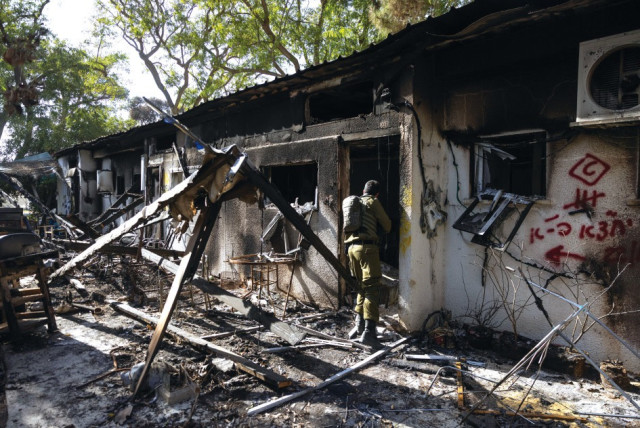How to secure Israel’s future amid escalating threats - opinion

Embracing a path of longevity and regional cooperation would enable Israel to break free from the cycle of war.
The recent escalation between Israel and Hezbollah has significantly increased Israel’s security concerns, adding another layer of complexity to an already volatile regional situation.
As Israel navigates this heightened conflict, it finds itself at a critical juncture – mirroring the broader strategic challenges facing the nation – in the ongoing campaign to defeat Hamas in Gaza and Hezbollah along the northern border and throughout the Middle East.
The pressing questions are as follows: “What strategic options does Israel have in light of the ongoing conflict?” and “Is there an urgent need to choose a path that ensures a stable and prosperous future for the Jewish state?”
The brutal massacre carried out by Hamas on October 7, followed by the war in Gaza and the escalating tensions with Hezbollah on the northern border – perilously close to war – and the broader conflict involving Iran and its proxies, highlighted by Iran’s unprecedented aerial assault on Israel on April 14, represent a seismic shift in Israel’s security landscape.
These events have profoundly affected the safety of Israel’s citizens and the very essence of the State of Israel as a Jewish, democratic, secure, and prosperous nation.
As the war continues and the Israeli government remains solely focused on military action without an apparent clear strategic objective, Israel finds itself at a crossroads.
What path can we go down?
One path is fraught with obstacles, creating a sense of stagnation and hesitance, rooted in fears of making bold decisions and a preference for managing conflicts rather than resolving them. This approach stems from a lack of confidence in achieving a resolution of the conflict and an unwillingness to bear the associated costs.
The other path, however, is driven by hope – a pursuit of peace through the establishment of political-security arrangements and the expansion of Israel’s partnerships in the Middle East and beyond. With no third path, Israel must choose between these two distinct paths.
Choosing the wrong path would lead to continued decline, dragging Israel into a prolonged war of attrition orchestrated by Iran, whose ultimate goal is to weaken and destroy the State of Israel.
Particularly troubling is the belief held by some political factions within the Israeli government that, as the state’s security deteriorates and Israel faces increasing international isolation, the rationale for annexing territories in Judea, Samaria, and Gaza becomes stronger, despite the immense burden of managing millions of Palestinian lives.
This approach plays into the hands of Israel’s enemies and extremists, risking the creation of a disastrous “one-state” reality that would not be Jewish or democratic, and certainly neither safe nor prosperous. The likely consequence would be hundreds of casualties each year, further empowering Iran and its allies, including Hamas and similar groups.
Moreover, Israel would become increasingly isolated globally, potentially labeled as an apartheid state by the international community. Such a scenario would severely undermine the personal security of Israeli citizens and erode the nation’s overall strength.
The stakes are high
GIVEN THESE high stakes, it is both surprising and alarming that the Israeli government has not chosen the path of hope, which remains open.
This path involves normalizing relations between Israel and Saudi Arabia and forming a regional security and economic coalition with moderate Arab states, under US leadership.
Regional security cooperation has already proven effective, particularly in missile defense and countering unmanned aerial threats as seen on April 14, and continues to be a viable strategy moving forward.
Although challenges are anticipated along this path – particularly establishing a framework for ending the war in Gaza, securing the safe return of Israeli hostages, and reaching a ceasefire along the northern border, it nevertheless presents a historic opportunity.
This path paves the way for establishing a regional security and economic coalition and reversing the negative strategic trends Israel has faced since October 7.
A moderate alliance would stand firm against Iran and the resistance camp, creating the conditions to shift the majority of Palestinians toward a more moderate stance, establishing an alternative government to Hamas in Gaza with the support of moderate Arab nations, and weakening extremist influences in the West Bank.
The success of moderate Arab countries in combating Islamic extremism could also help transform Palestinian education, reducing religious-nationalist radicalization, and fostering a culture of peace and coexistence.
The gateway to the path of hope is still open to establishing formal relations between Israel and Saudi Arabia while positively engaging with Saudi and American demands for an Israeli-Palestinian political horizon.
Given the repeated failures of bilateral Israeli-Palestinian negotiations, the renewal of the peace process must adopt a multilateral approach, involving traditional peace partners, the Abraham Accords countries, and Saudi Arabia.
Embracing this path of longevity and regional cooperation would enable Israel to break free from the cycle of war, initiate essential reconstruction and recovery processes, and strengthen its position, reputation, resilience, and security for years to come.
The writer, an IDF reserve brigadier-general, is a senior researcher at the Institute for National Security Studies (INSS).
Jerusalem Post Store
`; document.getElementById("linkPremium").innerHTML = cont; var divWithLink = document.getElementById("premium-link"); if (divWithLink !== null && divWithLink !== 'undefined') { divWithLink.style.border = "solid 1px #cb0f3e"; divWithLink.style.textAlign = "center"; divWithLink.style.marginBottom = "15px"; divWithLink.style.marginTop = "15px"; divWithLink.style.width = "100%"; divWithLink.style.backgroundColor = "#122952"; divWithLink.style.color = "#ffffff"; divWithLink.style.lineHeight = "1.5"; } } (function (v, i) { });

